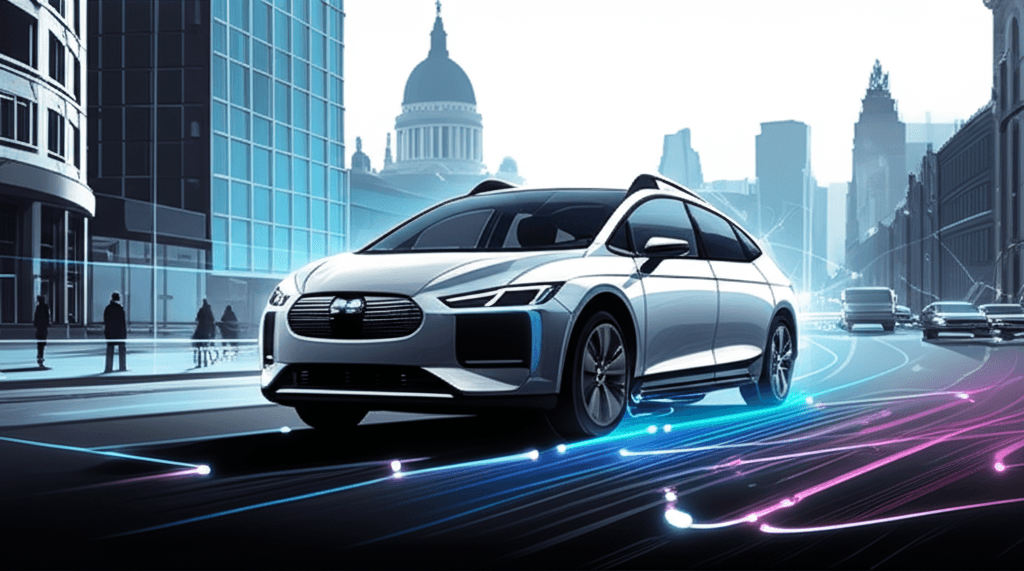UK leads AI innovation as Uber, Wayve start London robotaxi trials.
London's challenging streets become a proving ground for Uber and Wayve's groundbreaking L4 self-driving AI.
June 10, 2025

The United Kingdom is set to become a significant testbed for advanced autonomous vehicle technology as British AI company Wayve and global ride-hailing giant Uber announced plans to commence Level 4 autonomy trials on public roads in London.[1][2][3][4] This collaboration marks the UK as the largest market where Uber intends to pilot such sophisticated self-driving capabilities, signalling a major step towards the potential deployment of autonomous vehicles in complex European urban environments.[1][2][3] The initiative is bolstered by a new UK government framework aimed at accelerating self-driving commercial pilots, underscoring the nation's ambition to be a world leader in this technological frontier.[1][3]
The trials, expected to begin as early as spring 2026, will integrate Wayve's "embodied AI" platform into Uber's extensive mobility network.[1][5] Level 4 autonomy, as defined by the Society of Automotive Engineers (SAE), means the vehicle can perform all driving tasks without human intervention within specific, predefined conditions and geographical areas, known as its operational design domain (ODD).[6][7][8][9] While a human driver may still be present in some Level 4 vehicles with the option to take control, the system is capable of handling all situations within its ODD, including fallback procedures if a problem arises.[6][7][10] This is a significant jump from Level 3, which requires a human driver to be ready to intervene when requested by the system.[6][7] The London trials will involve navigating the city's notoriously complex and dynamic road layouts, which differ substantially from many US cities where much of the existing L4 testing has occurred.[1][2][3] Successful operation in London will provide invaluable data for refining L4 technology for diverse global urban settings.[1] Both Wayve and Uber will work closely with the UK Government and Transport for London to manage the permitting and regulatory approval processes necessary for the launch.[3]
At the heart of this venture is Wayve's distinctive approach to autonomous driving. Founded in 2017, the British AI company has pioneered an "embodied AI" or "AV2.0" system that relies on end-to-end deep learning.[11][12][13][14][15] This contrasts with traditional "AV1.0" methods that often depend on highly detailed, pre-built HD maps and a modular "sense-plan-act" architecture.[12][15][16] Wayve's AI Driver software is designed to learn from driving data in a way more analogous to human learning, enabling it to perceive, predict, and navigate dynamic environments, even those it hasn't encountered before, with greater adaptability.[11][15] The company asserts its technology is mapless and hardware-agnostic, meaning it can be scaled more easily to new roads, cities, and vehicle types.[11][13][14] This AI-first approach aims to equip vehicles with a "robot brain" that can understand and learn from human behaviour and master unexpected situations.[11][12][17] Wayve has already conducted trials on UK public roads since 2018 and has partnered with UK delivery fleets like Asda and Ocado Group.[13] The company recently secured a substantial $1.05 billion in Series C funding, led by SoftBank Group with contributions from NVIDIA and Microsoft, to further develop and launch its embodied AI products for production vehicles.[13][14][18][17] This funding is a significant endorsement of Wayve's technology and the UK's growing role in the AI sector.[13][18]
For Uber, these trials represent a continued strategic engagement with autonomous vehicle technology. After selling its previous self-driving unit, Advanced Technologies Group (ATG), Uber has shifted to a partnership-based model. The company already has collaborations with other autonomous vehicle developers in the US and Abu Dhabi.[19] The Wayve partnership allows Uber to explore L4 autonomy in a key international market, leveraging its vast ridesharing network and customer base. Uber's leadership has expressed readiness to deploy autonomous "robotaxis" in the UK as soon as the regulatory environment allows, viewing the technology as a path to potentially safer and more reliable transportation.[19][20][21] The UK government's supportive stance, including the recent passage of the Automated Vehicles Act 2024, is crucial.[22][23] This Act aims to create a comprehensive legal framework for the use of automated vehicles, focusing on safety and clear liability, with a goal of having self-driving vehicles on UK roads by the latter half of 2027.[19][22][23][21][24] The government anticipates that the autonomous vehicle industry could generate 38,000 jobs and be worth £42 billion to the UK economy by 2035.[24][1][25]
The implications of these trials extend far beyond London. Success could significantly accelerate the development and adoption of AI-driven autonomous vehicles globally. Wayve’s end-to-end learning approach, if proven effective and scalable in such a challenging urban environment, could influence the direction of AI research and development in the autonomous sector. It also highlights the UK's ambition to be at the forefront of AI and autonomous systems regulation and deployment, creating a supportive ecosystem for innovation.[26][27][28][25][29] However, challenges remain, including ensuring the verifiable safety and reliability of these complex AI systems, gaining public trust, and addressing the ethical and societal impacts, such as effects on professional drivers.[19][7][10][21] Experts emphasize that true readiness for autonomous vehicles involves not just technological capability but also robust regulatory frameworks, transparent decision-making processes by the AI, and thorough validation under diverse real-world conditions.[19][21]
In conclusion, the Wayve and Uber Level 4 autonomy trials in London mark a pivotal moment for the autonomous vehicle industry in the UK and potentially Europe. This collaboration brings together cutting-edge AI technology with a global mobility platform, operating within an increasingly supportive regulatory landscape. The outcomes of these trials will be closely watched, offering critical insights into the real-world capabilities of embodied AI, the challenges of deploying Level 4 autonomy in complex urban settings, and the broader future of AI-powered transportation. The initiative underscores the UK's commitment to fostering innovation in autonomous systems and could pave the way for a significant transformation in urban mobility.
Sources
[3]
[4]
[6]
[8]
[11]
[12]
[13]
[14]
[15]
[16]
[17]
[18]
[20]
[21]
[22]
[23]
[24]
[25]
[26]
[29]